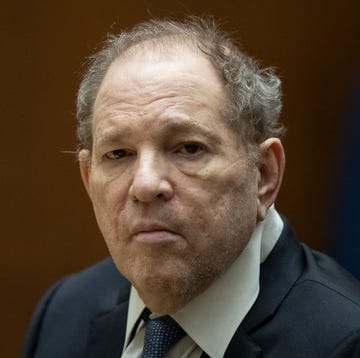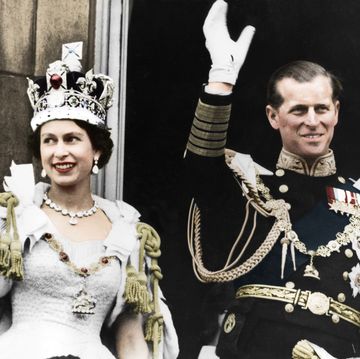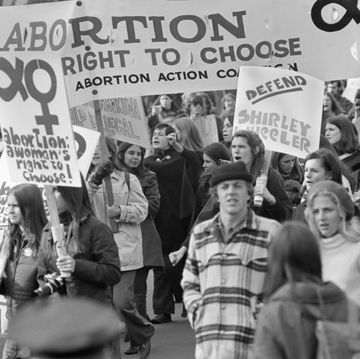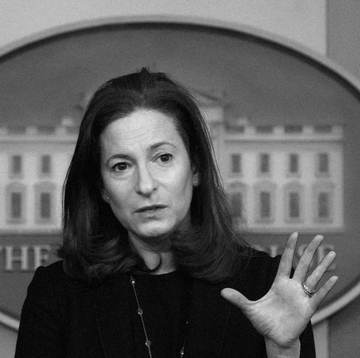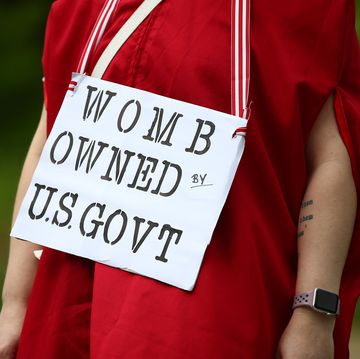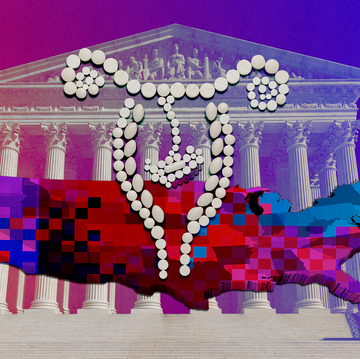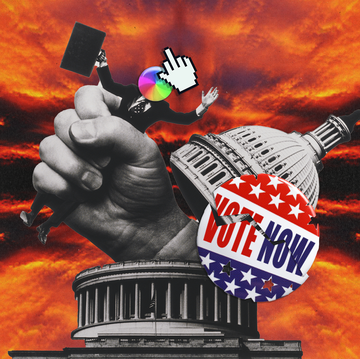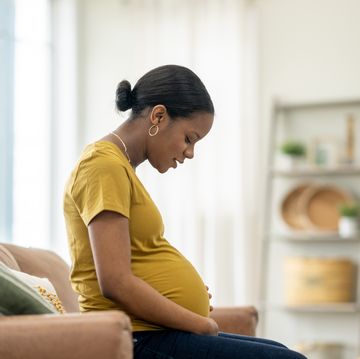Last June, Pew Research Center asked 3,217 people in the U.S. to rate members of each religion from 0 to 100; a score of 0 meant cold, negative sentiment and 100 meant warm, positive feelings. Muslims got an average score of 40. The only other group to get a similarly "cold" response were atheists, who also got a score of 40 on average.
But there's a big difference between those two groups: just 0.9 percent of the American population identify as Muslim compared to 3 percent who describe themselves as atheist. That might not sound like much of a gap but the thing is, it's easy to understand atheism on a spectrum of skepticism about God. And a lot of Americans are somewhere on that spectrum; almost 1 in 4 describe themselves as religiously unaffiliated (in addition to the 3 percent that say they're atheist, there are 4 percent who say they're agnostic and 16 percent who simply say "nothing in particular").
That means that if somebody claims atheists support a "rape culture" or simply "hate America," then it's easier for Americans to know those claims are wrong — they can think of Jiang at the office or Sarah from school. But when they hear the word "Muslim," many won't know anyone on a personal level they can attach the label to.
It's not just familiarity with individuals, it's about familiarity with religious theory too. Who hasn't pondered the existence of God? Debated it with a high school teacher, college friend, or romantic partner? How many by comparison have had a chat with someone they know about the prophet Muhammed?
Unlike atheists, Muslims are rarely depicted on any kind of spectrum of religiosity — it's kind of an all-or-nothing label. A Google image search for "muslims in America" is dominated by photos of individuals either protesting or kneeling in prayer. Almost all of the women are wearing headscarves. People like me are noticeably absent. (And don't even get me started on popular culture where the words Muslim and Arab are used interchangeably to depict billionaires, bombers, and belly dancers.)
Last month, I spent a week with my family who live in Downey, a sleepy grid of streets in southern California. Like most trips to see relatives, it was long overdue (13 years, to be exact), familiar (aside from the kitchen cupboards and the height of the children, nothing had changed), and predictably, comfortably, boring (as all trips are where you spend more time on your butt then your feet). One evening, my cousin Huda came through the door, preceded by her running 6 year-old son Hassanain and followed by her husband — she looked red-faced as she pulled off her jacket and headscarf.
When I asked her if she was OK, she said that she was just hot, that she had been playing soccer with Hassanain in the park. She paused and added, "There were some teenagers there … they started shouting things." She continued, "They said, 'Don't pretend to be an angel, you can't play soccer and wear that thing.'" My face immediately showed my anger but Huda quickly laughed to calm me and explained, "They think that when you wear this thing, you're a nun or something." When Americans fail to understand that religiosity is every bit as personal and nuanced for Muslims as it is for Christians, it's no wonder so many struggle to distinguish us from extremists who politicize Islam.
If it's assumed that headscarves and prayers show how Muslims think they are religiously perfect, then there's going to be a problem. Because it's easy to dislike someone you think is acting all "holier than thou" — and it's easy to suspect they've got something to hide. And of course we do! All the same little dirty secrets of lust, greed, and envy that families across America hide every day.
Earlier this year, I wrote an article for FiveThirtyEight.com, where I worked at the time, that looked at the strong correlation between familiarity with Muslims and favorability. The piece, which was titled "Americans Are More Likely To Like Muslims If They Know One" was up for about 24 hours before editors decided to switch off the comments. It was the first time since we had launched the site a year before that comments had to be disabled — and as far as I know, the same decision hasn't been made since then.
Here are a few of the responses I got before the comments were switched off (I've pasted these in verbatim, with misspellings of my name intact):
Monica Challabi, Americans are in NO Way like Muslims..........its obvious your perception of "Red White Blue" is very much distorted. You seriously need counseling and therapy or perhaps you should leave the United States and go live in "Camel Ville" say, you can even get yourself a goat and call it your BFF.
More muslim propaganda. If one really gets to know a muslims they will not like them. Muslims cannot be trusted and they have their own religious agenda. They believe they are superior to you. Muslims are not like us.
Mona: BS; I have known "many" muslims and they all lie like dogs; have NO respect for Christians; and they detest jews. Being a WASP and having many jewish friends I find their hatred of Jews disgusting.
Oh ya I want to like a person that belongs to a religious group that wants to kill me and my Christian family! I don't think so, move back to a Muslim country if you want to feel good. I don't like your relgion, you may be a nice person but not someone I want to be friends with.
Since the site uses Facebook comments, these people published their thoughts publicly, with their full name, photo and in some cases, even where they worked. It might be a handful of Internet haters but their words reveal so much more than a number on Pew's "feeling thermometer." They show that dislike of Muslims and distrust of Muslims are almost indistinguishable feelings.
And because most people conflate religion, race, immigration, and language, that distrust extends to groups who aren't even necessarily Muslim. Last month, a passenger at Chicago's Midway airport complained to security personnel about being afraid to fly after hearing Maher Khalil talking Arabic with a friend who was also boarding the plane. The 29-year-old Philadelphia pizza shop owner (Khalil that is, not the complainer) and his friend were asked to step aside and were questioned by airport security and the police before eventually being allowed to take the flight.
In a separate incident at the same airport on the same day, six men of Middle Eastern descent were removed from a flight following passenger complaints about a seating arrangement dispute. That same week, a woman on a flight from Baltimore became concerned by a man who appeared to be of Middle Eastern descent who was watching the news on his phone. After being removed from the plane, he was eventually released without charge the next day.
Recounting just three of these incidents feels a little tedious and repetitive, but so are the everyday experiences of many American Muslims who, like me, are faced continually with the question "what, if anything, can we do to prove that we're no different to anyone else?"
Maybe instead of explaining ourselves we should get better at explaining why we don't need to explain ourselves.
During an interview on MSNBC last month, Dalia Mogahed, research director at the Institute for Social Policy and Understanding, was asked whether more Muslim leaders should speak out against ISIS. She responded:
I think we should take a step back and ask a different question, which is: "Is it justified to demand that Muslims condemn terrorism?" Now that might sound a little radical even asking it. The reason I say that is this.Condoning the killing of civilians is, to me, about the most monstrous thing you can to do. And to be suspected of doing something so monstrous, simply because of your faith, seems very unfair.
Because even when Muslims take out full-page ads to condemn terrorist attacks, I know my friend's boyfriend will ask me again the next time I see him (as he does every time), "Why aren't Muslims speaking up?" Or he'll ask, "Look at how we treat Muslims here — do you think we'd get the same treatment if we went to Saudi Arabia?"
His questions show that he thinks I need to answer for the actions of those abroad. The fact that he doesn't ask anyone else in the room those questions shows that he thinks my passport counts for less than his, even though they've got the same cover. It's not just me. Even when Muslims denounce ISIS in posts on Facebook and Twitter, even whey they march on the streets to decry terrorism, Donald Trump will still claim that they were cheering when 9/11 happened.
If you are reading this and thinking my claims about distrust of Muslims are a bit overblown, if you think Trump's willingness to create a database of Muslims, as he stated in an interview last month, is far too outlandish to actually happen, I would caution you to think again. This isn't mere rhetoric. I'm confident a Muslim database could happen because it already has. Since at least 2002, the New York City Police Department has engaged in surveillance of Muslims in New York City and beyond based on religious profiling.
Vaughn Hillyard, the NBC reporter who first suggested the Muslim database to Trump, chased him down for a follow-up interview after they met last month. He asked, "Why would Muslim databases not be the same thing as requiring Jews to register in Nazi Germany? What would be the difference?"
The presidential candidate briefly looked up from signing T-shirts and books and repeated the same three words four times: "You tell me."
Follow Mona on Twitter.

